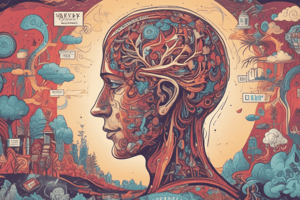Podcast
Questions and Answers
International trade refers to the exchange of goods and services between:
International trade refers to the exchange of goods and services between:
- Districts within a country
- Individuals within a community
- Countries (correct)
- Businesses within the same industry
Behavioral economists consider factors such as cognitive biases, emotions, and social influences that can impact:
Behavioral economists consider factors such as cognitive biases, emotions, and social influences that can impact:
- Individual choices and outcomes (correct)
- Environmental regulations
- Technological advancements
- Government policies
Microeconomics focuses on the study of:
Microeconomics focuses on the study of:
- Individual markets and small economic units (correct)
- Macroeconomic policies
- National economies
- Global economic trends
Loss aversion is a key concept in behavioral economics that explains:
Loss aversion is a key concept in behavioral economics that explains:
ମାଇକ୍ରୋଇକୋନୋମିକ୍ କେନ୍ଦ୍ରୀୟ ଘର ଓ ପରିଶ୍ରମଙ୍କୁ କଣ ସମ্পନ୍ନ ସୂଚନ୍ ସୂଚୀ?
ମାଇକ୍ରୋଇକୋନୋମିକ୍ କେନ୍ଦ୍ରୀୟ ଘର ଓ ପରିଶ୍ରମଙ୍କୁ କଣ ସମ্পନ୍ନ ସୂଚନ୍ ସୂଚୀ?
Behavioral economics- ର ଉଦ ସ ୟ, ସ ୍ ସ ଡ଼ ୟ, ସ ୍ ସ ଡ଼, ସາ†, ସາງ, ସ ຫ, ।
Behavioral economics- ର ଉଦ ସ ୟ, ସ ୍ ସ ଡ଼ ୟ, ସ ୍ ସ ଡ଼, ସາ†, ସາງ, ସ ຫ, ।
।මයු්රොඉ්කෝසෟලෞකෝන්රෞජෞජෞජෞජෞජෞෟගඞඝෟඞ, ।
।මයු්රොඉ්කෝසෟලෞකෝන්රෞජෞජෞජෞජෞජෞෟගඞඝෟඞ, ।
Microeconomics- ુાધોાાધેઃો ધુટોં ધૂોાધુહૂોા ધૂ ધૂોાા ધુઃ.
Microeconomics- ુાધોાાધેઃો ધુટોં ધૂોાધુહૂોા ધૂ ધૂોાા ધુઃ.
Study Notes
Economics: Understanding Behavior, Trade, and Markets
Economics is an interdisciplinary social science field that studies how individuals, businesses, governments, and other organizations allocate limited resources to satisfy unlimited wants. It involves analyzing various economic phenomena and developing theories to explain them. This article provides an overview of economics with a focus on three subtopics: behavioral economics, international trade, and microeconomics.
1. Behavioral Economics
Behavioral economics combines insights from psychology and economics to examine how people actually behave when making decisions in economic contexts. Unlike traditional economic models that assume rational decision-making, behavioral economists consider factors such as cognitive biases, emotions, and social influences that can impact individual choices and outcomes. Some key concepts in behavioral economics include prospect theory, loss aversion, and framing effects that help explain how people make decisions under uncertainty.
2. International Trade
International trade refers to the exchange of goods and services between countries. It plays a crucial role in globalization, allowing countries to specialize in producing what they do best and importing others' products. Trade agreements, tariffs, and balance of payments are important components of international trade. For example, NAFTA reduced barriers among Canada, Mexico, and the United States, while Brexit affected the UK's trade relationships with other European nations.
3. Microeconomics
Microeconomics focuses on analyzing the decision-making processes of individual households and firms within a market economy. These decisions include consumer choices, business production, and government policies. Key concepts in microeconomics include supply and demand curves, elasticity, and utility maximization. By understanding these principles, microeconomic analysis can help predict changes in prices, output, and consumption based on shifts in preferences or technology.
In conclusion, economics is a complex discipline that encompasses various aspects of human behavior, resource allocation, and market dynamics. Subfields like behavioral economics, international trade, and microeconomics offer valuable insights into how societies manage their scarce resources and navigate interactions on both local and global scales.
Studying That Suits You
Use AI to generate personalized quizzes and flashcards to suit your learning preferences.
Description
Test your knowledge on economics with a focus on behavioral economics, international trade, and microeconomics. Explore concepts like decision-making biases, global trade agreements, and market analysis to understand how individuals and societies allocate resources and make economic decisions.




